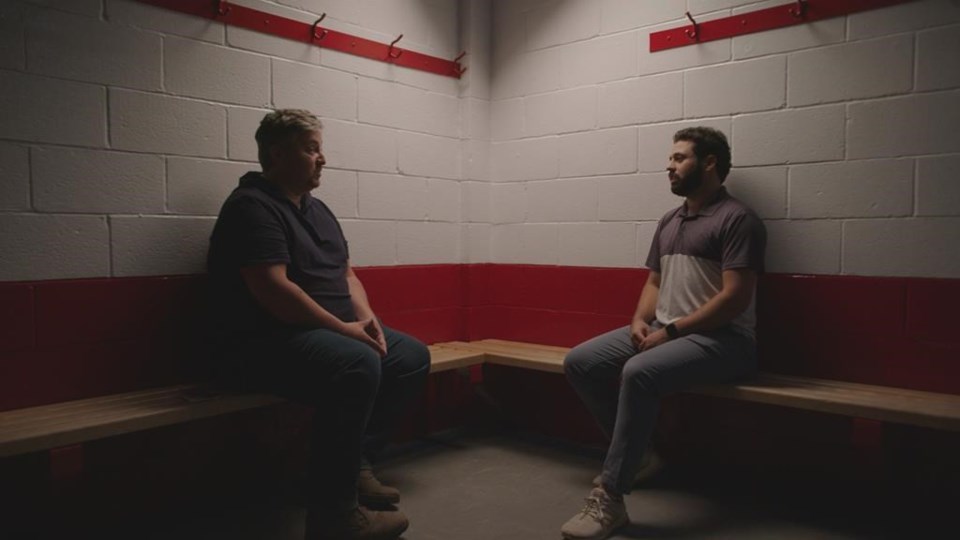PodcasterRyan McMahon is not interested in leading the conversation around defunding and abolishing the police.
However, he is aware those calls have been increasingly taking place in Black, Indigenous and racialized communities across North America since the 2020 killing of George Floydby a police officer in Minneapolis.
Instead, the Anishinaabe writer uses his latest docuseries, "Thunder Bay," to examine the North American movement that supports the reallocation of funds from police departments to community and social services by putting the embattled city under the microscope.
"Thunder Bay" is a four-part investigative series that aims to shed light on the history of racism in the city and how police inaction may have played a role in the deaths of Indigenous people over the years.
The series is billed as a deep look at the country's complicated relationship with colonialism, examining the consequences of the broken system in which some can thrivebut many others struggle to survive.
"Colonization is a hell of a drug. And, it has failed specific groups of people over and over again," McMahon said in a recent phone interview from Toronto.
"What is crystal clear through four episodes of 'Thunder Bay' is that these particular (institutions) — the police service, the city and the public safety systems inside the city of Thunder Bay — simply aren't working."
The series is produced and developed by McMahon and Entertainment One in association with Bell Media for Crave.McMahon also wrote and co-directed the series.
It follows McMahon's work on Canadaland's podcast of the same name released in 2018 where he delved into the unexplained deaths of Indigenous youth in the city and systemic racism.
This project left McMahon with more questions than answers, so when Entertainment One expressed interested in developing a television series, he jumped on board. The team originally had plans to bring the project to various broadcasters and streamers but after meeting with Crave felt it was a good fit.
McMahon said Crave understood how important the story was and trusted the crew to tell the story they wanted to tell.
"Thunder Bay, in part, has earned its reputation. There are problems there. Those in power turning a blind eye to those problems has not helped," said McMahon.
"We went in with an ambitious plan, and we have come out with something that contributes positively to advancing the call for change inside the city."
The first episode of the series focuses on the death of Barbara Kentner in 2017. Kentner, an Anishinaabe woman from Wabigoon Lake Ojibway Nation, died six months after Brayden Bushby, a non-Indigenous man from Thunder Bay, threw a trailer hitch at her from a moving car.
The case made national headlines and contributed to a divide in the community as the defence argued during the trial Kentner's pre-existing conditions related to liver disease would have resulted in her death.
"If a young white man admits to killing an Indigenous woman and that young man is not sentenced, what message does it send to Indigenous women across this country?" said McMahon. "So the stakes were very high for that reason alone."
Bushby admitted to throwing the trailer hitch and was eventually sentenced to eight years in prison for manslaughter.
The second episode focuses on some of the stories behind mysterious deaths of seven First Nations youth whose bodies were found in nearby waterways. Families criticized the police for failing to act on concerns or brushingthem off when they submitted missing-persons reports. An inquest concluded in 2016 and resulted in 145 recommendations.
McMahon uses interviews from local reporters to contextualize some of the long-standing issues the city is dealing with.
Thunder Bay has made headlines for not only the high number of deaths and attacks on Indigenous people, but for police's allegedambivalent attitudes when investigating these cases.
The Thunder Bay Police Service has also garnered attention for its internal problems, including the recent resignation of police chief Sylvie Hauth following her suspension and misconduct charges.
An officer was recently found guilty of investigating the 2015 death of Stacey DeBungee with bias, andwas demoted and ordered to undergo cultural competency training.
"We've almost become notorious in a way," said Willow Fiddler, the Globe and Mail's reporter in Thunder Bay.
"This is not a matter of what's happened in the past. These are all issues that are very much continuing today."
Fiddler was one of the journalists interviewed for the series. She has covered the area for seven years and has frequently reported on issues with the police service.
"Any media attention on these issues is still seen as negative by the city and police, and not worthy of watching or paying any attention to," she said.
Thunder Bay police did not sit down for the series, said McMahon.
Scott Paradis, Thunder Bay police media relations co-ordinator, told The Canadian Press some of the topics McMahon wanted to speak about were still being investigated. The service would not comment on the series ahead of its release.
Fiddler hopes the series brings awareness to the issues of racism against Indigenous people not only in Thunder Bay but across the country as well.
As for McMahon, after speaking with numerous families who have been calling for change, in some cases fordecades, he hopes viewers continue conversations around the efficacy of systems put in place to protect the community.
"Are they working? Who are they working for? 'Thunder Bay' is a conversation about Canada (and) about North America."
The first two episodes are available now on Crave and the final two episodes will be available on Feb. 24.
This report by The Canadian Press was first published Feb. 18, 2023.
Brittany Hobson, The Canadian Press
Note to readers: This is a corrected story. A previous version identified the former chief of the Thunder Bay Police as Sylvia Hauth. Her name is, in fact, Sylvie Hauth.




